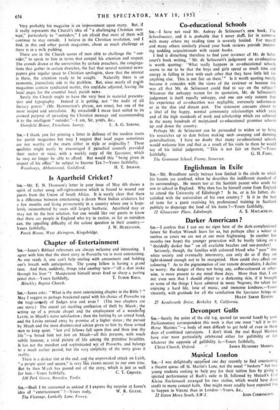Co-educational Schools
have not read Mr. Aubrey de Selincourt's new book, The Schoolmaster, and it is probable that I never shall, for in comm, .n with many others my reading time is severely limited: For myself and many others similarly placed your book reviews provide interest- ing nodding acquaintances with recent books.
I find it disturbing therefore to find your reviewer of Mr. de Selin- court's book writing, " Mr. de Selincourt's judgement on co-education is worth quoting: ' What really happens in co-educational- schools seems to me to be that the boys and girls spend so much time and energy in falling in love with each other that they have little left for anything else. This is not fair on them.'" Is it worth quoting merely because it coincides with the views of the reviewer or because this was all that Mr. de Selincourt could find to say on the subject ? Whatever the unhappy reason for its quotation, Mr. de Selincourt's judgement is itself equally unhappy, and one can only assume that his experience of co-education was negligible, extremely unfortunate or in the dim and distant patt. The statement amounts almost to a libel 'of the happy, normal community relationships which exist and of the high standards of work and scholarship which are achieved in. the many hundreds of maintained co-educational grammar schools up and down the country.
Perhaps Mr. de Selincourt can be persuaded to widen or to bring his researches up to date before making such sweeping and damning generalisations. I have no doubt that many co-educational schools would welcome him and that as a result of his visits to them he would say of his initial judgement, "This is not fair on them."—Yours faithfully, G. H. FAIRS. The Grammar School, Frome, Somerset.






































 Previous page
Previous page